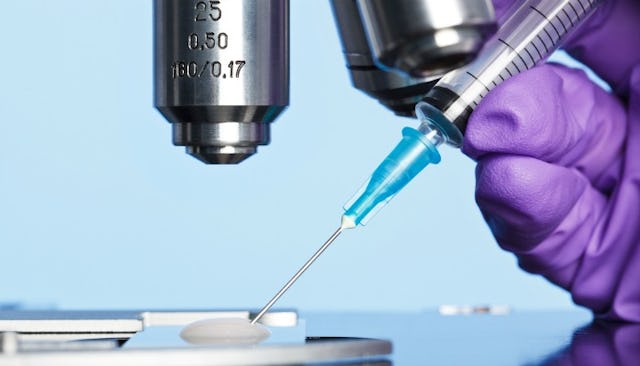What Fertility Preservation Really Means

My boyfriend and I knew we wanted kids someday. We talked about it often when we wondered about the future. Both of us knew we wanted more than one. Both of us wanted to have kids sooner rather than later in life—preferably after a few years of marriage.
Then he proposed to me, and for a night, the future we imagined felt more real than anything I had ever dreamed.
But the next day, I got a terrifying phone call. He’d collapsed at a company softball game and was being rushed to the hospital. The first time I called myself his fiancée was when I arrived at the emergency room, looking for him. Within a few hours, his CT scan had shown the doctors cancerous masses in his brain.
Within 10 days of getting engaged, we found ourselves sitting with his parents and a social worker, walking us through what would happen over the next few weeks. He would need chemotherapy, radiation, to apply for clinical trials. The social worker asked if we were interested in fertility preservation. Before I could even wrap my head around what that meant, my future mother-in-law spoke up.
“Yes,” she said. “They definitely want to have kids someday.”
And like that, it was settled. Over the next week, my fiancé made the maximum allowable sperm deposits, to be frozen for future use, and I started researching my end of the deal. What I learned was that freezing my eggs would have a lower probability of success than freezing embryos, and so my fiancé and I agreed to find a fertility clinic and get things started immediately.
Luckily for us, miraculously, he got better. By the time our fertility clinic had put us through the months of genetic testing, legal footwork, physical examinations and STD screenings, our wedding was nearing. Only a few months after getting married, we decided to go ahead and get pregnant.
Our first round of fertility treatments and egg extractions yielded 12 viable eggs, from which we got eight viable embryos. Our fertility specialist implanted two of those into my uterus, and froze the other six.
We didn’t know if we’d ever have a chance to get pregnant “naturally.” Chemotherapy can cause permanent damage to rapidly dividing cells—that includes sperm, and that meant that the three sperm deposits my husband made in those weeks after our engagement might be our only chance for children, ever.
We lucked out on our first try. Both embryos took, and we had beautiful, healthy twin girls 35 weeks later. The fertility clinic kept the other embryos in the freezer for us.
Every year, the clinic sent us a letter, asking us if we wanted to keep storing our embryos. Every year, we paid the fee. We didn’t know if we wanted more kids. We didn’t know if we needed to go through the IVF process again. We didn’t know anything, but that we had six viable embryos, six other potential children, waiting in the wings for us if we wanted them.
My husband got lucky again. His sperm returned to normal, undamaged by the year he spent on chemotherapy. Then we got lucky together. We conceived our third child naturally, without the assistance of clinics or injections.
Again, the clinic wanted to know if we wanted to continue storing our embryos.
We decided we were done having children. My second pregnancy was complicated to the extreme and seriously endangered my health. Getting pregnant again, even with those spectacular embryos, was too high a risk.
But there are a lot of laws about what you can’t do with your frozen embryos if you decide you don’t need them anymore. You can’t give them away. It’s extremely expensive to transport and donate them to a facility that does research on embryonic tissue. The easiest and cheapest option is to have them destroyed, and that hurt. I don’t believe an embryo is a living person, but it’s definitely potentially a person, and not only that, those six embryos were part of me. Part of my husband. In a way, part of our family.
I still feel sad when I think about those six incinerated embryos. I wish I could have donated them to a couple trying to start their own family. I wish I could have fixed my own body and our family finances so that somehow we could have brought all six of those babies into the world.
Freezing my eggs, or embryos, came with more baggage than I ever imagined—huge philosophical questions and even bigger conversations. I have no regrets, but I wish I’d talked to more people who had been through something similar before making the decisions I did. I’d tell anyone thinking of doing the same, think about what happens at the end, think of what happens when you’re done with them. Plan for that, not just for the children you produce in the process.
Plan for a little grief, at the end, even with all the joy.
This article was originally published on